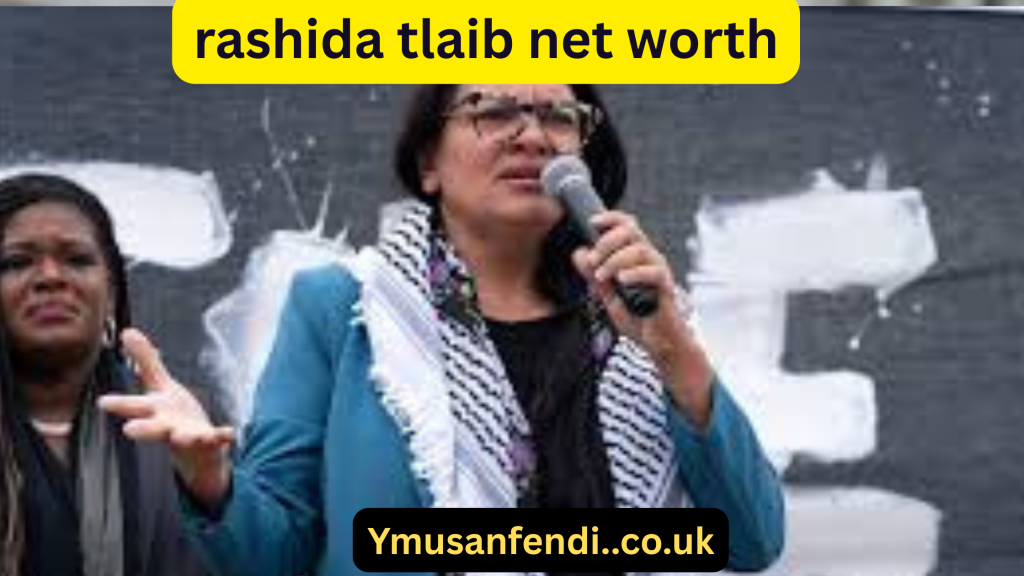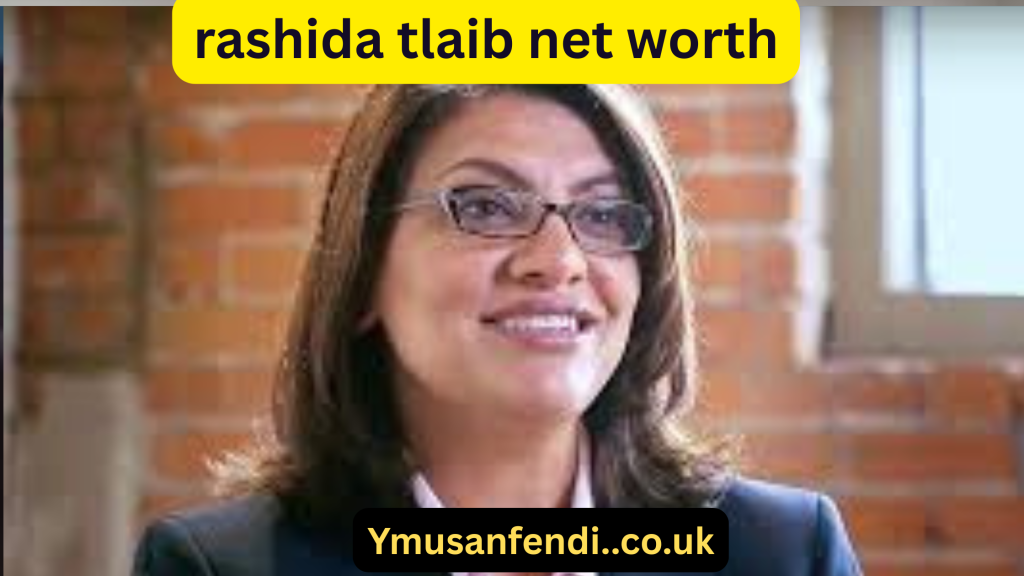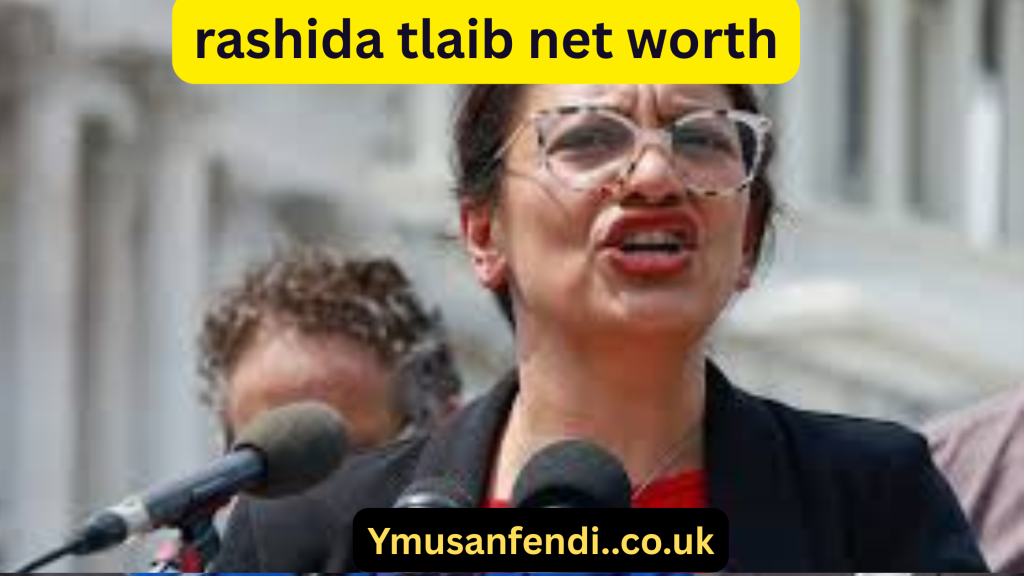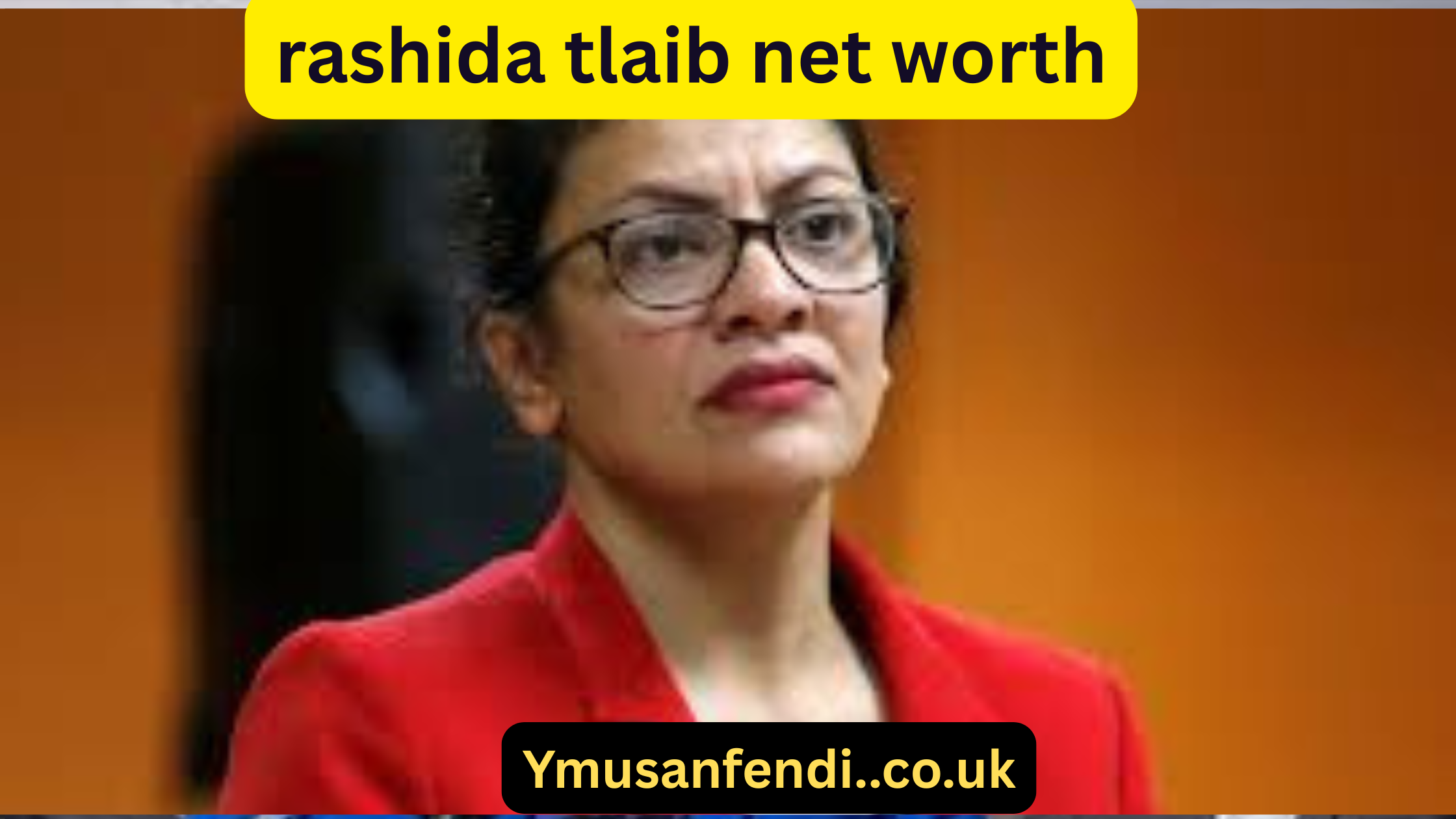Introduction
Rashida Tlaib, a prominent figure in American politics, has garnered significant attention not only for her progressive policies and activism but also for her financial standing. As the first Palestinian-American woman elected to the U.S. Congress, representing Michigan’s 12th district, Tlaib’s net worth has been a subject of public interest. Understanding her financial background provides insight into the economic aspects of her political career and the broader context of wealth among public servants.
Rashida Tlaib Net Worth: In-Depth Analysis
Rashida Tlaib, a U.S. Representative for Michigan’s 12th district, has become a prominent political figure, known for her progressive views and activism. As with many public figures, her net worth has been a subject of public interest. In this section, we’ll explore her financial background, including her salary, assets, liabilities, and estimated net worth, along with other financial considerations that affect her wealth.
Estimated Net Worth of Rashida Tlaib
Rashida Tlaib’s net worth is estimated to range between negative $673,979 to $289,997, according to her latest financial disclosures. These figures are derived from her reported assets, liabilities, and income sources.
Salary as a U.S. Representative
As a member of the U.S. House of Representatives, Tlaib receives an annual salary of $174,000, which is the standard salary for all members of Congress. This salary is the primary source of her income, although additional sources may contribute to her overall wealth.
Assets and Investments
Tlaib’s assets are primarily real estate investments and stocks, valued between $176,021 and $690,000. The exact value of these assets can fluctuate depending on the real estate market and the performance of her stock investments. These investments suggest a moderate level of wealth, though not extraordinarily high compared to many of her colleagues in Congress.
Tlaib holds stocks in various funds, including:
- American Funds Europacific Growth Fund R6
- Dodge & Cox Stock Fund—Class X
- State Street S&P 500 Index Non-Lending Series Fund Class A
Each of these investments is valued between $15,001 and $50,000.
Liabilities and Debts
Tlaib’s liabilities, including mortgages and student loans, are between $400,003 and $850,000. These debts significantly affect her net worth, as they could potentially outweigh her assets. The largest of these liabilities are likely related to her real estate holdings and student loans.
Real Estate Holdings
One of Tlaib’s major assets is a rental property in Detroit, valued between $100,001 and $250,000. This piece of real estate, along with her other investments, adds to her wealth, though the exact value can fluctuate based on market conditions.
Public Perception of Tlaib’s Wealth

Tlaib’s financial profile is relatively modest, especially compared to other members of Congress, many of whom have significantly higher net worths due to large investments or family wealth. Tlaib’s financial transparency, with her public disclosures, reflects her commitment to addressing issues such as income inequality and corporate greed. Her financial standing, however, also serves as a reminder of the financial challenges faced by many public servants.
Over the years, various reports have attempted to estimate Tlaib’s net worth, reflecting the complexities involved in assessing the financial status of public officials. These estimates consider her salary as a congresswoman, assets, liabilities, and other financial disclosures. However, it’s important to note that such figures are often approximations due to the nature of financial reporting and the absence of exact valuations for certain assets.
In this article, we delve into the details of Rashida Tlaib’s net worth, examining the factors that contribute to her financial profile, the challenges in estimating her wealth, and how her financial standing compares to other members of Congress. By the end, readers will have a clearer understanding of the economic dimensions of Tlaib’s political journey.
Early Life and Career

Born on July 24, 1976, in Detroit, Michigan, Rashida Tlaib was raised in a working-class Palestinian-American family. She graduated from Wayne State University with a Bachelor of Arts in Political Science and later earned her Juris Doctor from Thomas M. Cooley Law School. Before entering Congress, she served in the Michigan House of Representatives from 2009 to 2014, becoming the first Muslim woman to serve in the Michigan Legislature. Her legal background and legislative experience laid the foundation for her subsequent political career.
Entry into U.S. Congress
Tlaib made history in 2018 by becoming one of the first two Muslim women elected to the U.S. Congress, alongside Ilhan Omar. Representing Michigan’s 13th congressional district, she succeeded longtime Representative John Conyers. In 2023, following redistricting, she began representing the 12th district. Her election was a significant milestone for diversity and representation in American politics.
Salary as a U.S. Representative
As a member of Congress, Tlaib receives an annual salary of $174,000, which is standard for all U.S. Representatives. This salary constitutes a significant portion of her income and is publicly disclosed. However, it’s important to consider other potential sources of income that may contribute to her overall financial standing.
Financial Disclosures and Net Worth Estimates

Financial disclosures filed by Tlaib provide insight into her assets and liabilities. According to her 2023 financial disclosure report, her assets ranged from $176,021 to $690,000, while her liabilities were between $400,003 and $850,000. These figures suggest a net worth that could be negative, indicating liabilities exceeding assets. It’s important to note that these estimates are based on ranges provided in the disclosures, and exact figures are not specified.
Sources of Income Beyond Salary
In addition to her congressional salary, Tlaib may have other sources of income. These could include earnings from speaking engagements, book royalties, or investments. However, specific details about these income sources are not always publicly disclosed, making it challenging to provide a comprehensive picture of her financial status.
Real Estate Holdings
Tlaib’s financial disclosures indicate ownership of real estate properties, including a rental property in Detroit valued between $100,001 and $250,000. Real estate can be a significant asset, contributing to an individual’s net worth. However, the exact value and equity in these properties are not fully detailed in the available reports.
Investments and Stock Holdings
According to her financial disclosures, Tlaib holds investments in various funds, such as the American Funds Europacific Growth Fund R6, Dodge & Cox Stock Fund—Class X, and State Street S&P 500 Index Non-Lending Series Fund Class A, each valued between $15,001 and $50,000. These investments suggest a diversified portfolio, though the exact performance and returns are not specified.
Liabilities and Debts
Tlaib’s liabilities, as reported in her financial disclosures, include mortgages and student loans, totaling between $400,003 and $850,000. These debts significantly impact her net worth, potentially outweighing her assets. It’s important to consider these liabilities when assessing her overall financial standing.
Comparison with Other Members of Congress

Compared to other members of Congress, Tlaib’s net worth appears relatively modest. Many members have significantly higher net worths, often due to investments, businesses, or family wealth. Tlaib’s financial profile reflects her background and the challenges faced by public servants in managing personal finances.
Public Perception and Media Coverage
Media coverage of Tlaib’s financial disclosures has varied, with some outlets highlighting her liabilities and others focusing on her advocacy for economic justice. Public perception of her financial status is influenced by these narratives, which can impact her political image.
Rashida Tlaib’s Political Philosophy and Impact

Rashida Tlaib’s political philosophy is deeply rooted in progressive values, with a strong emphasis on social justice, economic equity, and environmental sustainability. She is particularly known for advocating policies aimed at addressing income inequality, advocating for universal healthcare through Medicare for All, and supporting a Green New Deal to combat climate change. Tlaib has been an outspoken critic of corporate influence in politics, emphasizing the need for a government that prioritizes the needs of working-class citizens over wealthy elites. Her commitment to justice is also reflected in her stance on criminal justice reform, where she seeks to reduce mass incarceration and address systemic racism.
Her influence in Congress has extended beyond legislation. Tlaib is also a vocal advocate for marginalized communities, particularly Palestinian Americans. Her ability to speak openly about her heritage has helped broaden the conversation on issues related to U.S. foreign policy in the Middle East, specifically in relation to Palestine and Israel.
Rashida Tlaib’s Advocacy for Palestinian Rights
One of the most distinctive aspects of Rashida Tlaib’s political career is her staunch advocacy for Palestinian rights. As the first Palestinian-American woman to serve in Congress, she has consistently used her platform to speak out about the plight of Palestinians in the occupied territories. Tlaib is known for her vocal criticism of U.S. policies towards Israel, especially with regard to military aid and the ongoing occupation of Palestinian lands. Her views have sometimes sparked controversy, especially given the sensitive nature of Middle East politics. However, Tlaib’s advocacy is grounded in her personal connection to her Palestinian heritage, and she has faced significant support from those who believe that the U.S. government needs to adopt a more balanced approach in its foreign policy regarding Israel and Palestine.
Tlaib has also advocated for sanctions against Israel due to its human rights violations and has been a key supporter of the Boycott, Divestment, and Sanctions (BDS) movement. This advocacy has made her a polarizing figure in American politics, as it often places her in opposition to the majority of U.S. politicians, who tend to support Israel.
Tlaib’s Relationship with Corporate America
Throughout her political career, Rashida Tlaib has been highly critical of corporate influence in American politics. She has consistently called for increased transparency and accountability from large corporations, particularly those involved in the fossil fuel industry, healthcare, and finance. Her calls for stronger regulation of big business, alongside her push for a wealth tax, reflect her belief that the government should work for the people, not corporations.
Tlaib’s refusal to accept corporate donations for her campaigns is a testament to her commitment to keeping her political decisions independent of corporate interests. This stance aligns with her broader vision of political reform and the reduction of corporate influence on policymaking. Her approach to campaign finance is seen as part of her broader commitment to fighting corruption and ensuring that elected officials work for their constituents, rather than wealthy donors.
Rashida Tlaib’s Public Image and Media Portrayal

Rashida Tlaib has garnered significant media attention throughout her career, both for her progressive politics and her personal story. As a Muslim woman of Palestinian descent, she has broken many barriers in American politics, which has led to both admiration and criticism. Her outspoken and unapologetic style has made her a polarizing figure in the media. She has gained widespread recognition for her bold statements, such as her call to “impeach the motherf***er” in reference to former President Donald Trump, which went viral and solidified her reputation as a fierce and candid political figure.
Tlaib has been the subject of both positive and negative media coverage, reflecting the broader political divide in the United States. Progressive outlets often highlight her advocacy for the marginalized, while conservative media criticize her positions on Israel and her willingness to challenge the political establishment. Despite the mixed media portrayal, Tlaib’s public image as a fearless advocate for change has resonated with many, particularly young voters who feel that the political system needs radical reform.
Rashida Tlaib’s Educational Background and Legal Career
Before entering politics, Rashida Tlaib had a notable legal career, which laid the foundation for her approach to public service. She earned a Bachelor of Arts in Political Science from Wayne State University and went on to receive her Juris Doctor from Thomas M. Cooley Law School. Tlaib’s legal training helped shape her understanding of law and policy, making her a capable and informed legislator.
Her background as a lawyer gave her the tools to navigate the complexities of government regulations and legal frameworks, helping her to craft and advocate for legislation that aligns with her values. Additionally, Tlaib’s legal career focused on advocacy for communities facing injustice, particularly in the context of housing rights and economic equality. Her expertise in law, combined with her legal work, has made her an effective advocate for policies that challenge corporate greed and address the needs of underserved communities.
Financial Transparency and Political Accountability

Tlaib’s approach to financial transparency is another aspect of her political ethos. She has been an advocate for greater accountability in both government and corporate finance. By publicly releasing her financial disclosures, Tlaib has demonstrated her commitment to transparency, showing that her wealth comes primarily from her congressional salary and real estate holdings. This is a contrast to many of her colleagues in Congress, some of whom have been accused of using insider knowledge for personal gain.
Her openness regarding her financial status underscores her dedication to public service. Tlaib has pushed for legislation that would further limit the influence of money in politics, advocating for reforms to the political donation system and the lobbying industry. This transparency is an essential part of her political platform, which seeks to restore trust in government institutions and ensure that elected officials work for the people they represent.
Tlaib’s Role in the Progressive Caucus

Rashida Tlaib is an active member of the Congressional Progressive Caucus (CPC), a group of U.S. legislators dedicated to advancing progressive policies. The CPC serves as a powerful bloc within Congress, pushing for initiatives such as universal healthcare, a living wage, and comprehensive climate action. Tlaib’s role in the caucus has been crucial, as she uses her position to advance policies that align with her progressive agenda, such as her push for Medicare for All, a Green New Deal, and the elimination of student debt.
Her alignment with the CPC allows her to collaborate with other progressive leaders, such as Alexandria Ocasio-Cortez and Ilhan Omar, to shape legislation that aims to address the needs of working-class Americans. Through her work with the CPC, Tlaib has become one of the leading voices in the U.S. for progressive change, advocating for a more equitable and just political system.
Rashida Tlaib’s Work on Economic Justice
Economic justice has been a cornerstone of Rashida Tlaib’s political career. She has consistently advocated for policies that aim to address income inequality, such as a living wage, universal basic income, and stronger labor protections. Tlaib is a vocal supporter of raising the federal minimum wage to $15 an hour, as well as implementing progressive taxation that would tax the wealthiest Americans more heavily to fund social services.
Tlaib has also been a strong advocate for student debt relief, believing that the U.S. government should cancel significant portions of student loan debt to provide financial relief to millions of Americans. These policies are part of her broader vision to create a fairer economy where all people have access to the resources and opportunities they need to thrive. Her economic justice platform is rooted in the belief that the current economic system disproportionately benefits the wealthy and leaves many Americans struggling to make ends meet.
Rashida Tlaib’s Family and Personal Life

Rashida Tlaib is known for her close-knit family, which has played an important role in her life and career. She is the daughter of Palestinian immigrants, and her personal story has been a driving force behind her commitment to public service. Tlaib has spoken frequently about her upbringing in Detroit, describing how her parents’ immigrant experience shaped her values and fueled her determination to serve her community.
Tlaib is also a mother to two sons, and she has been open about the challenges of balancing her demanding political career with her responsibilities as a single mother. Her family’s support has been a constant source of strength throughout her political journey, and Tlaib often emphasizes the importance of community and solidarity in her work.
Conclusion
Rashida Tlaib’s net worth provides a glimpse into the financial aspects of her political career. While estimates suggest a modest financial standing, it’s important to consider the complexities involved in assessing the wealth of public officials. Her financial disclosures reflect a combination of assets, liabilities, and income sources that collectively shape her economic profile. Understanding these factors offers valuable insight into the intersection of personal finances and public service.
FAQs
What is Rashida Tlaib’s estimated net worth?
Based on her 2023 financial disclosure report, Rashida Tlaib’s net worth is estimated to be between -$673,979 and $289,997. This range reflects her reported assets and liabilities.
How does Rashida Tlaib’s net worth compare to other members of Congress?
Compared to other members of Congress, Tlaib’s net worth appears relatively modest. Many members have significantly higher net worths, often due to investments, businesses, or family wealth. (finbold.com)
What are Rashida Tlaib’s primary sources of income?
Tlaib’s primary source of income is her congressional salary of $174,000 per year. Additionally, she may have other sources of income, such as earnings from speaking engagements or book royalties, though specific details are not publicly disclosed.
Does Rashida Tlaib own any real estate?
Yes, according to her financial disclosures, Tlaib owns a rental property in Detroit valued between $100,001 and $250,000. Real estate can be a significant asset, contributing to an individual’s net worth.
What investments does Rashida Tlaib have?
Tlaib holds investments in various funds, including the American Funds Europacific Growth Fund R6, Dodge & Cox Stock Fund—Class X, and State Street S&P 500 Index Non-Lending Series Fund Class A, each valued between $15,001 and $50,000. These investments suggest a diversified portfolio.
What liabilities does Rashida Tlaib have?
Tlaib’s liabilities, as reported in her financial disclosures, include mortgages and student loans, totaling between $400,003 and $850,000. These debts significantly impact her net worth.
Has Rashida Tlaib faced any financial controversies?
There have been no major financial controversies involving Tlaib. Her financial disclosures are publicly available and have been reviewed by various watchdog organizations.
How transparent are Rashida Tlaib’s financial disclosures?
Tlaib’s financial disclosures are publicly available and provide detailed information about her assets, liabilities, and income sources. These disclosures are in line with federal requirements for members of Congress.
Has Rashida Tlaib’s financial status affected her political career?
There is no evidence to suggest that Tlaib’s financial status has negatively impacted her political career. Her focus on progressive policies and advocacy for economic justice resonates with many of her constituents.
What can we learn from Rashida Tlaib’s financial profile?
Tlaib’s financial profile highlights the challenges faced by public servants in managing personal finances. It underscores the importance of transparency and accountability in financial disclosures and offers insight into the economic dimensions of public service.
Conclusion
Rashida Tlaib’s net worth provides a glimpse into the financial aspects of her political career. While estimates suggest a modest financial standing, it’s important to consider the complexities involved in assessing the wealth of public officials. Her financial disclosures reflect a combination of assets, liabilities, and income sources that collectively shape her economic profile. Understanding these factors offers valuable insight into the intersection of personal

